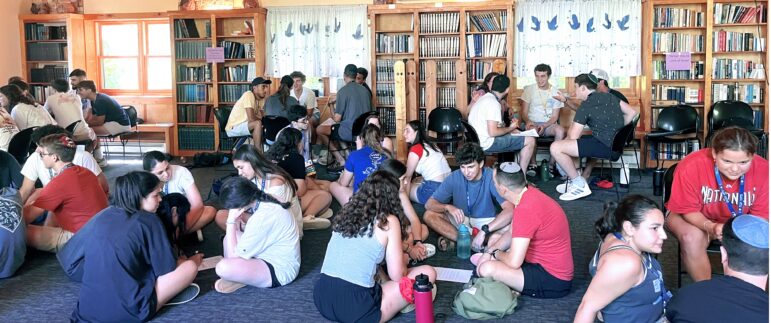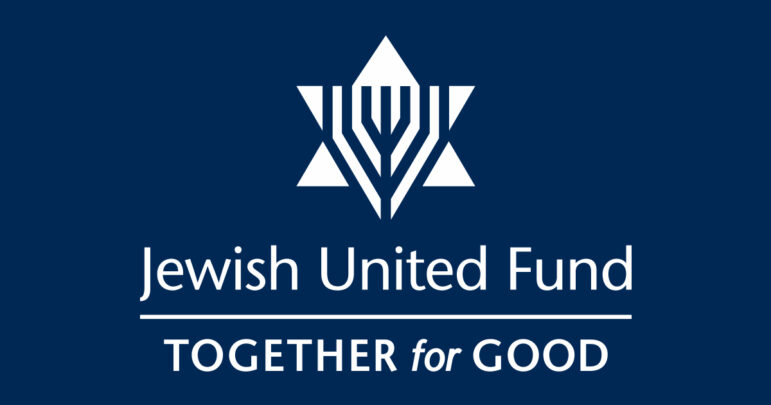
How do we equip young people with the skills and confidence to engage thoughtfully with one of the most important issues in Jewish life today: Israel?
Moving Traditions’ new Jewish Identity and Israel curriculum offers an educational journey for teens, supporting them in understanding the modern state of Israel, navigating the complexities of Israel and the Israeli-Palestinian reality, while exploring their Jewish identity and personal values.
Grappling with the complexities of our Jewish homeland has never been more important. With the memory of the events of October 7 still fresh and the current events in the Middle East, it is clear that we need to help the teens in our communities make sense of the world around them. Our Jewish identity and Israel track is uniquely positioned to do just that.
I felt more connected to Israel and learned more about others, my family, and myself.
— Midwest teen participant from the 2025 pilot
Learn More
About the Curriculum
Talking about Israel can feel really challenging. . . but it doesn’t have to be.
The Jewish Identity and Israel track is part of our plug-and-play Kulam curriculum, featuring activities, discussion prompts, text, and media that help educators engage teens. Participants will dive into the concept of Israel as “home,” gain insights into the historical background of Zionism, encounter the diversity of modern Israeli society, engage with Palestinian history, and confront the major points of contention in the Israeli-Palestinian reality. By creating an inclusive and exploratory learning environment, we help teens develop their own nuanced perspectives and foster a sense of pride and belonging within Jewish community. The curriculum is written for 8th and 9th graders and can be used with modification for younger or older teens. The complete session outline is below.
Outline of Kulam Track: Jewish Identity and Israel
| Session | Objectives: By the end of this session, participants will be able to . . . |
|---|---|
| Yahrzeit: Remembering October 7th | — Reflect on the major events that took place on, and in the wake of, October 7th. — Explore the attack’s effect on Israeli society and themselves, through use of Israeli art, Jewish ritual, and scaffolded discussion prompts. — Participate in a memorial ritual to honor the victims of October 7th. |
| Jewish Identity | — Explore the personal experiences and emotions that are connected to Jewish identity. — Reflect on the relationship between their Jewish identity and their other identities. — Support their peers in connecting to Jewish identity. |
| Peoplehood | — Reflect on what it means to be part of the Jewish people and why they should care about Israelis and the global Jewish community. — Learn how both Israel and the Jewish diaspora have influenced and shaped Jewish identity throughout history. — Strengthen their connection to Jewish communities worldwide and view engagement with Israel as a meaningful expression of their Jewish identity. |
| Home/Land 1 | — Explore their own sense of home and what it means for Jews globally to view Israel as a shared home. — Reflect on their connection to Israel using the themes of am (people), eretz (land), and medina (state). — Consider different ways to engage with Israel that align with their personal values and interests. |
| Home/Land 2 | — Explore the concepts of am (people), eretz (land), and medina (state) in relation to Israel and Jewish identity. — Reflect on the idea of having “homes” in both America and Israel, and how this dual connection influences their sense of identity and belonging. — Learn about the key aspects of Israeli society, including its environment, laws, and culture. |
| History of Zionism | — Explore the history and origins of Zionism as a Jewish national movement, recognizing the diverse visions within it. — Gain foundational knowledge about major Zionist thinkers and their contributions to the movement. — Encouraged to articulate their own vision for Israel’s future and consider how they can contribute to its actualization. |
| Diversity of People in Israel | — Learn about the diverse ethnic, religious, and identity groups that contribute to Israel’s cultural mosaic. — Deepen their understanding of what it means to be Israeli, recognizing both the benefits and complexities of Israel’s diversity. — Engage with modern Israeli culture, appreciating how Israel’s diversity enriches the global Jewish experience. |
| Palestinian Perspectives | — Engage with Palestinian poetry, art, and music to gain insights into Palestinian life both within Israel and beyond. — Learn about the history and cultural experiences of the Palestinian people, fostering a deeper understanding of their identity. — Explore potential models for coexistence between Israelis and Palestinians, encouraging thoughtful reflection on shared futures. |
| The Matzav: Understanding Key Elements of the Conflict | — Gain a foundational understanding of the origins and ongoing dynamics of the conflict. — Explore the complexities and reasons why the Israeli-Palestinian conflict remains difficult to solve. — Develop the knowledge and confidence to articulate their own views on the conflict and advocate for their beliefs in public discourse. |
| Media Bias: Israel Edition | — Develop and apply strategies for discerning bias in media. — Develop and apply strategies for identifying misinformation in media. — Examine real world media about Israel, employing the skills learned. |
| Strategies for Engagement | — Learn how to handle heated rhetoric and decide when and how to engage in debates or activism constructively. — Practice listening to opposing views, setting personal boundaries, and maintaining respectful discourse during difficult conversations. — Feel empowered and prepared to navigate conversations about Israel and related issues in future campus environments. |
Family Session
Israel Family Session: Wonders and Challenges
In this session, parents and teens will explore their personal connections to Israel through activity and dialogue. Participants will reflect on both the ancient and modern history of Israel, deepening their understanding of the wonders and challenges the country faces today. This experience aims to strengthen family dialogue about Israel, encouraging thoughtful, respectful conversations that foster connection across generations.
Funding Partner
Our Israel Curriculum is made possible by support from:

